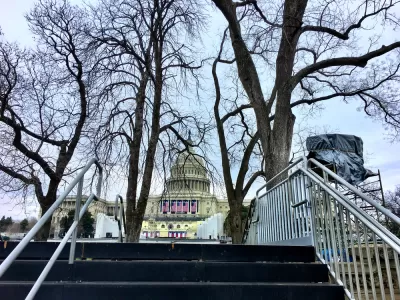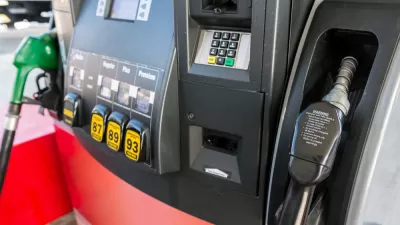The incoming chair of the House Transportation and Infrastructure Committee, Peter DeFazio (D-Ore.), points to gubernatorial races and a California ballot initiative to show there's no peril for legislators to hike the gas tax.

"Rep. Peter DeFazio, an Oregon Democrat expected to head the committee when his party takes over the House of Representatives in January, told MarketWatch that this month’s midterm elections showed raising [state] gasoline taxes isn’t a political third rail, and that it’s 'something we can work on' with President Donald Trump as Washington tries to fashion an infrastructure package," reports Robert Schroeder.
Infrastructure is back in the spotlight after the midterms, with Democrats, Trump and Republican leaders all expressing interest. But paying for improvements and new projects will be the “hangup,” according to incoming House Minority Leader Kevin McCarthy, a California Republican.
But this last election demonstrated there’s no “political peril” for lawmakers who would raise the gasoline tax if they show voters it will improve roads and bridges, [DeFazio] said in a lightly edited interview with MarketWatch about his ideas.
First question: How do you propose to pay for instructure investment?
DeFazio points to the "three bipartisan infrastructure proposals" listed on his "Investing in America" webpage, the first one being "A Penny For Progress (H.R. 1664)."
Rather than increasing the 18.4 cent federal gas tax and 24.4 cent diesel tax, unchanged since 1993 when it was increased by 4.3 cents per gallon, the bill takes an extremely modest approach by indexing the gas and diesel tax to highway construction costs and reduced fuel usage due to Corporate Average Fuel Economy (CAFE) standards, i.e., fuel efficiency standards. It hasn't moved since being introduced in March 2017, but it wasn't his first attempt at it either.
DeFazio introduced an earlier version of the bill in March 2013 where it also languished under the Obama administration that was not receptive to increasing the gas tax.
Second question: "To be clear, you believe the president would still be on board with some form of a gasoline tax?"
DeFazio expressed optimism that an agreement could be reached with the Trump administration.
The president, in my one meeting with him, advocated a substantial gas-tax increase, so I think this is still something we can work on, and we’re going to need the president, because there’s a reluctance on the part of some in the Senate.
However, it was DeFazio's analysis of how gas taxes fared in the midterms that was the most illuminating part of the interview.
In California, [incoming House] Minority Leader [Kevin] McCarthy used personal campaign funds to put on a ballot measure [Proposition 6] to repeal their gas tax and fee increase, and he got his head handed to him, in more ways than one, and it pretty well p’d off a lot of groups that are traditionally supporting Republicans — [the Associated General Contractors of America (AGC)] and others.
And then Tim Walz, my colleague, ran for governor of Minnesota and advocated a 10-cent gas increase. Next door, Michigan, a woman [Gov.-elect Gretchen Whitmer] — both red to blue states — advocated, she said, “Fix the damn roads.” [See: Minnesota Gubernatorial Candidate Campaigned on Increasing the Gas Tax and Wins].

Planetizen Federal Action Tracker
A weekly monitor of how Trump’s orders and actions are impacting planners and planning in America.

Map: Where Senate Republicans Want to Sell Your Public Lands
For public land advocates, the Senate Republicans’ proposal to sell millions of acres of public land in the West is “the biggest fight of their careers.”

Restaurant Patios Were a Pandemic Win — Why Were They so Hard to Keep?
Social distancing requirements and changes in travel patterns prompted cities to pilot new uses for street and sidewalk space. Then it got complicated.

Platform Pilsner: Vancouver Transit Agency Releases... a Beer?
TransLink will receive a portion of every sale of the four-pack.

Toronto Weighs Cheaper Transit, Parking Hikes for Major Events
Special event rates would take effect during large festivals, sports games and concerts to ‘discourage driving, manage congestion and free up space for transit.”

Berlin to Consider Car-Free Zone Larger Than Manhattan
The area bound by the 22-mile Ringbahn would still allow 12 uses of a private automobile per year per person, and several other exemptions.
Urban Design for Planners 1: Software Tools
This six-course series explores essential urban design concepts using open source software and equips planners with the tools they need to participate fully in the urban design process.
Planning for Universal Design
Learn the tools for implementing Universal Design in planning regulations.
Heyer Gruel & Associates PA
JM Goldson LLC
Custer County Colorado
City of Camden Redevelopment Agency
City of Astoria
Transportation Research & Education Center (TREC) at Portland State University
Camden Redevelopment Agency
City of Claremont
Municipality of Princeton (NJ)




























